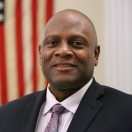
On July 30, the President released the National HIV/AIDS Strategy: Updated to 2020, which will guide our efforts—at the national, state, and community levels—through the end of the decade. The updated Strategy retains the original Strategy’s Vision and four overarching Goals, but updates its Steps, Actions, and Indicators to incorporate the incredible progress we’ve made over the last five years, and highlights key areas of critical focus over the next five years, notably:
- Widespread HIV testing and linkage to care;
- Broad support for people living with HIV to remain engaged in comprehensive care;
- Universal viral suppression among people living with HIV;
- Full access to comprehensive pre-exposure prophylaxis (PrEP) services.
We had the privilege of launching the updated Strategy with an event at Morehouse School of Medicine in Atlanta, and were able to give voice and space in particular to the populations outlined in the Strategy as those with the greatest HIV burden and disparities in the United States, including young Black gay men, transgender women, Black women, and people who inject drugs.
Our 2020 vision is clear: over the next five years, we need to increase focus on the right people, right places, and right practices.
Community organizations from around the country have expressed steadfast support of the updated Strategy, and have echoed the President’s words when he said, “we can’t let up now… let’s keep working for an AIDS-free generation.” Here’s what some have said:
Advocates for Youth (Washington, DC):
“Young people have advocated for 30 years for their needs to be prioritized in the HIV and AIDS response. With the release of the new NHAS we know that their voices have been heard. We are excited by the renewed commitment from this Administration to ensure new HIV infections will be rare, ensure that everyone has access to the care they need regardless of circumstances, and to end HIV discrimination and stigma.”
amfAR, the Foundation for AIDS Research (New York, NY):
“Our nation’s response to the HIV epidemic is stronger and more coordinated than ever before, but we still have important work to do to ensure the Strategy goals are met. We remain committed to working with the White House, policymakers at all levels of government, and community stakeholders in putting the Strategy into action and ending the HIV epidemic once and for all.”
Human Rights Campaign (Washington, DC):
“The revisions to this critical national strategy come at a crucial time in the fight to end the HIV and AIDS epidemic. While HIV affects Americans from all walks of life, gay and bisexual men, transgender women, youth, and communities of color are disproportionately affected, particularly in the South. Achieving an AIDS-free generation is within our grasp, and Congress must ensure the Obama Administration has the vital resources it needs to meet the strategy’s achievable goals.”
Positive Women’s Network-USA (Oakland, CA):
“PWN-USA, a national membership body of women living with HIV, applauds the Strategy’s stated commitment to address the effects of past and current trauma in HIV care, and its expansion of priority populations which now include Black women, transgender women, youth, and people in the Southern states.”
Urban Coalition for HIV/AIDS Prevention Services (Washington, DC):
“UCHAPS will work with our partners to aggressively pursue the targets and adjust programs to reach the goals by 2020… We do need to update and re-tool our approach. The Updated Strategy 2020 will assist our communities to do just that.”
AVAC: Global Advocacy for HIV Prevention (New York, NY):
“The [Strategy] importantly acknowledges the essential role of research in providing new tools and methods of achieving the goals of the strategy. The NHAS is unabashedly positive about research, with particular emphasis on research priorities for PrEP and innovative approaches to preventing new infections, importantly strengthening the case that now is not the time to scale back.”
National Black Women’s HIV/AIDS Network (Houston, TX):
“We are moving into a higher level of consciousness, action, and urgency in order to stem the tide of HIV in our community. As gatekeepers of our community and caregivers of our families, we look toward the future, take ownership of the proposed compelling challenges outlined in the NHAS 2020, and recommit our voices as a force of change, believing that our lives matter and when one dies all communities die.”
San Francisco AIDS Foundation (San Francisco, CA):
“The process used to update the NHAS was a model of community engagement, focusing on populations, like gay and bisexual men, most disproportionately impacted by HIV. Bringing the best biomedical and behavioral science to the table, community worked with a responsive federal government to craft innovative responses to persistent disparities in health outcomes. The NHAS update reflects that community partnership and recommendations to address the HIV epidemic we face at the local level.”
Academy of Managed Care Pharmacy (Alexandria, VA):
“AMCP is pleased to see that the White House’s national strategy for HIV/AIDS includes pharmacists as vital members of the interdisciplinary health care team to improve outcomes along the care continuum. Managed care pharmacists, in particular, work with prescribers and other providers to ensure patients have access to effective, safe, and affordable HIV medications. Our profession has been at the forefront of identifying and implementing effective programs designed to improve both outcomes and adherence.”
Gay Men’s Health Crisis (New York, NY):
“GMHC is proud to have worked closely with the White House to help provide key feedback and data from our work. Today’s update to the National HIV/AIDS Strategy takes everything that we have learned about treating and preventing this disease and incorporates it into a thoughtful plan that will guide and coordinate efforts to end this epidemic across the country.”
We look forward to working with stakeholders across sectors and around the country to implement the updated Strategy and achieve its 2020 goals.


